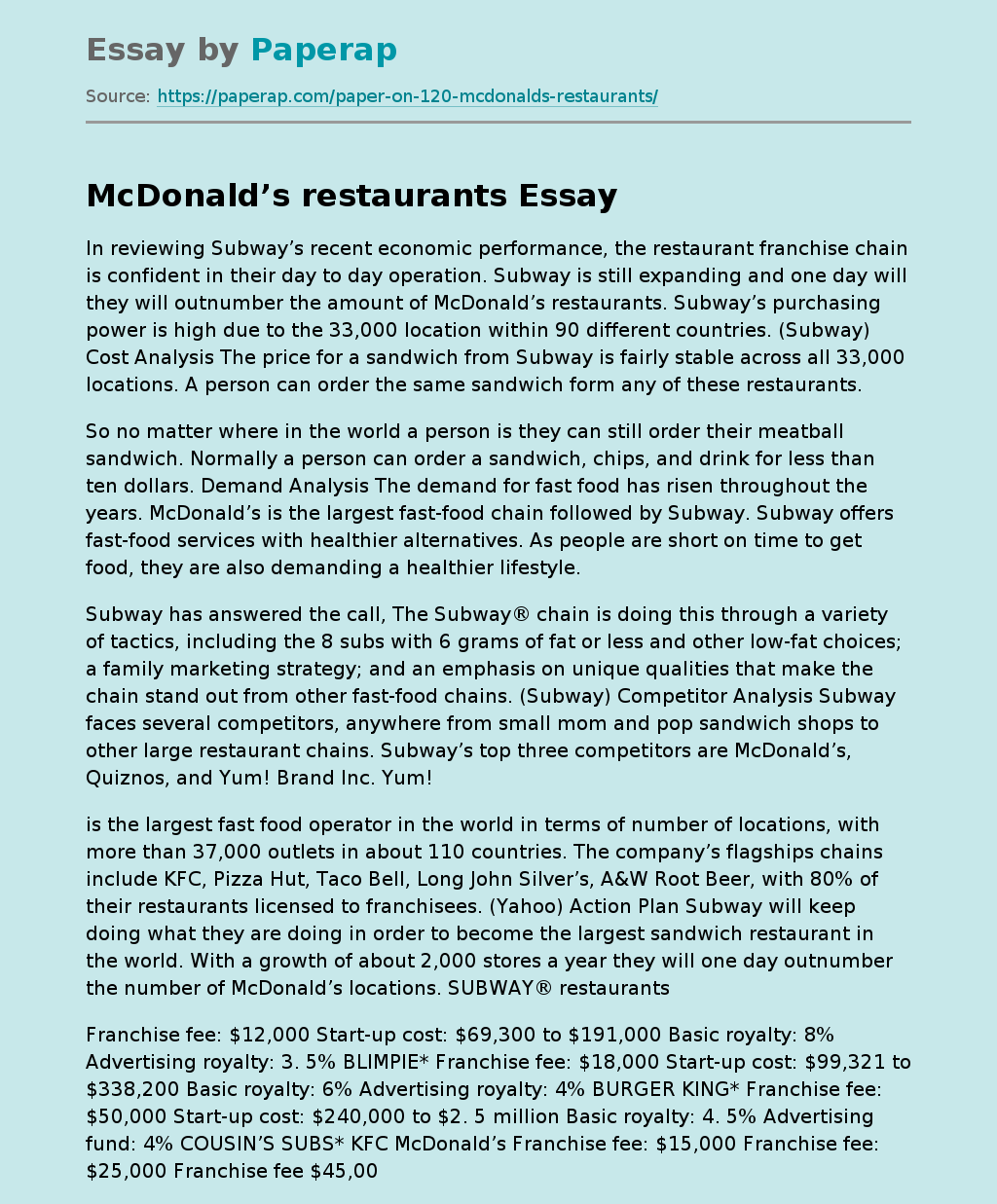McDonald’s restaurants
In reviewing Subway’s recent economic performance, the restaurant franchise chain is confident in their day to day operation. Subway is still expanding and one day will they will outnumber the amount of McDonald’s restaurants. Subway’s purchasing power is high due to the 33,000 location within 90 different countries. (Subway) Cost Analysis The price for a sandwich from Subway is fairly stable across all 33,000 locations. A person can order the same sandwich form any of these restaurants.
So no matter where in the world a person is they can still order their meatball sandwich.
Normally a person can order a sandwich, chips, and drink for less than ten dollars. Demand Analysis The demand for fast food has risen throughout the years. McDonald’s is the largest fast-food chain followed by Subway. Subway offers fast-food services with healthier alternatives. As people are short on time to get food, they are also demanding a healthier lifestyle.
Subway has answered the call, The Subway® chain is doing this through a variety of tactics, including the 8 subs with 6 grams of fat or less and other low-fat choices; a family marketing strategy; and an emphasis on unique qualities that make the chain stand out from other fast-food chains.
(Subway) Competitor Analysis Subway faces several competitors, anywhere from small mom and pop sandwich shops to other large restaurant chains. Subway’s top three competitors are McDonald’s, Quiznos, and Yum! Brand Inc. Yum!
is the largest fast food operator in the world in terms of number of locations, with more than 37,000 outlets in about 110 countries.
The company’s flagships chains include KFC, Pizza Hut, Taco Bell, Long John Silver’s, A&W Root Beer, with 80% of their restaurants licensed to franchisees. (Yahoo) Action Plan Subway will keep doing what they are doing in order to become the largest sandwich restaurant in the world. With a growth of about 2,000 stores a year they will one day outnumber the number of McDonald’s locations. restaurants
Franchise fee: $12,000 Start-up cost: $69,300 to $191,000 Basic royalty: 8% Advertising royalty: 3. 5% Franchise fee: $18,000 Start-up cost: $99,321 to $338,200 Basic royalty: 6% Advertising royalty: 4% Franchise fee: $50,000 Start-up cost: $240,000 to $2. 5 million Basic royalty: 4. 5% Advertising fund: 4% KFC McDonald’s Franchise fee: $15,000 Franchise fee: $25,000 Franchise fee $45,000 Start-up cost: $200,000 average Start-Up Cost: $250,000 Start-Up Cost $432,000 to $715,150
Basic royalty: 6% Basic royalty: 7. 90% Basic royalty: 12. 5% Advertising royalty: 2% Service fee: 4. 90% Module 15Revenue Sources In 2008, Subway made $926. 2 million dollars in sales. That is a 1. 9% sales growth for the sandwich shop chain. In 2008 they employed 700 employees working at their headquarters. They are expecting a 9. 7% growth within their work force. Due to the fact most stores are a franchise the profit margin varies from store to store because they are independently owned.
Therefore each store must pay their employees from each stores profit instead of coming from a corporate office. (Doctor’s Associates Inc) Operating Costs Due to the fact most Subway restaurants are privately held by different individuals the operating cost varies from location to location. Generally speaking each store must pay 8% of their sales to royalty costs. The cost in which it takes to run the stores will include land or rent payments, the cost of raw materials in order to make the food, electricity, and any other services in which the store might need to be successful.
Start-Up Costs In order to open up a new Subway restaurant a business will need $78,600 to $238,300 for their total investment. The initial franchise fee is $15,000 with royalties of 8%. The owner of the new store has to agree to the terms of agreement for 20 years. (Franchise Mall) Profitability According to Doctor’s Associates Inc they cannot promise any projected profit or return on investment for new Subway franchises. Doctor’s Associates Inc release this statement because there is no magic formula in order to make a Subway franchise be success.
Although In 2009, Doctor’s Associates made $926. 2 million dollars in sales from their 8% royalties. That is a 1. 9% sales growth for the sandwich shop chain. It is hard to get an actual number on how profitably each franchise is due to the fact they are all independently owned. Location and the customer base are all factors on how successful each location is. ( Subway) Action Plan With around $300,000 a person can open their own Subway restaurant store. 8% of the stores revenue will have to pay back for royalties.
To be very successful and make a nice living a person will need to own and operate several stores. There is money to be made and a market to be taken. (Subway) Financial Gains The profitable Subway franchise will undoubtedly profit from our operations in Brazil. Merging Subway’s success with Brazil’s culture will be Subway’s primary interest. Economic Benefits Subway’s focus will be equal opportunity for males and females alike—the majority of Brazil’s workforce is made up of men who earn higher salaries. Social Benefits
Expanding Subway’s franchise to Brazil will be the stepping stone to expanding in neighboring countries. Because Subway will be adapting Brazil’s culture into our products and services, we will be preserving and enhancing Brazilian culture. Social Costs Subway was founded in the United States, a country with values much different than Brazil. In fact, many American values are considered to be offensive in the Brazilian culture. We must closely monitor our company’s practices prior to expansion.
McDonald’s restaurants. (2017, Apr 29). Retrieved from https://paperap.com/paper-on-120-mcdonalds-restaurants/

